#i work as auxiliar teacher
Text
@CCcreators WE NEED MORE HAIRSTYLES LIKE THIS FOR KIDS PLEASW😭😭



#im working in a school#i work as auxiliar teacher#with kiddos#and everytime some girl came to class with her hair full of laces or beads#i gain a year of life#its so cute 😭😭😭#i wanna this on my simmies#public wcif#wcif#ts4 cc
671 notes
·
View notes
Text
The teachers of Madrid are going on strike tomorrow, and while I as a government "auxiliar" do not officially have the legal right to join... all of the teachers I work for tomorrow are joining and they canceled all of my classes.

4 notes
·
View notes
Text
An Auxiliar of Conversation in Chipiona, Spain.
My time in Spain has been amazing. I only wish I could stay longer for more years but unfortunately, do to familial issues, I have to return to the United States.
I work as Auxiliar de Conversacion for the NALCAP program. I work at Colegio Publico Principe Felipe and have had an experience far greater than I had hoped. My teachers and administrative staff were extremely helpful in my transition to the school and have had a lot of patience for my spanish, as I am learning proper grammar and new vocabulary.
The first week, I was super overwhlemed from just moving across the world. However, my teachers were receptive and kind to me during my mini breakdown at school and I am very greatful for their kindness and warmth. They always answered any questions I had about doctors in the area, to bank information, to payment, to best places to visit during the breaks, and often invited me out for lunch or other celebrations with them, and sometimes paid for my meals. They have a special place in my heart and I hope to stay in contact with them after I depart.
The students have also been great. I have to admit. Before I started the position, teaching children sounded scary, as I was questioning how do i make this experience interesting and fun for them. Especially since I remembered how bored I could be during class in my youth and wished for more interesting things. At first, I did struggle trying to get the attention of the children, however, the children of Spain are much nicer, more polite, and more helpful to each other and myself in comparison to my experience with American children. Which was a culture shock to me. They are bright, eager to learn, and I often find them teaching me things about spanish, spain, and pop culture things, like Shakira´s song about her ex.
As far as the town, the people are also very kind and have been helpful in my transition to the spanish lifestyle, as well. The town is on the smaller beach town vibes but is quite busy with acitivities and people during the spring and summer because many people have beach homes here from Sevilla. I´ve enjoyed the peacefulness during the winter and am excited for the spring and summer here, as the beach and water is some of the best in spain! There are activities to do during the year such as Carnival, Semana de Santa, and other festivals specific to the town. The city is walkable, however, if I knew how to ride a bike, I would like one or a scooter on days I don´t feel like walking but the area is enjoyable to walk through nonetheless. There are things like the lighthouse, Rocio Jurado museum, wine tastings, among other things to do in the area, outside of beach days.
Also, there are other bigger towns and cities nearby for tourism that´s really cool to visit and very cheap as for public transportation compared to the USA. Things like buses, blabla car, and other things.
lastlily, the food has been the biggest culture shock. everything is so fresh and good. I have not tasted real food until I came here. oddly, all of my allergies that I had in the USA doesnt exist in spain. I can eat lactose, gluten, alcohol, and beef without any digestion issues, reactions, nor bloating, and my skin cleared up significantly. So, I am a bit sad to return to the states regarding this specificially.
In the end, I highly recommend this town and this school, as I have thoroughly enjoyed my coworkers and students.
I love you, Spain. Thank you for opening my eyes to the lifestyle I hope other countries adapt for the comfortablility and quality of life that every human being deserves to experience.
1 note
·
View note
Text
Retriever dog kennel instructions
RETRIEVER DOG KENNEL INSTRUCTIONS >>Download
vk.cc/c7jKeU
RETRIEVER DOG KENNEL INSTRUCTIONS >> Leia online
bit.do/fSmfG
Kennel Club Collection includes instructions for making a 12" Rottie Pup Stuffed Plush Toy Dogs: Ty Classic 13" Plush Goldwyn Golden Retriever Dog You do not mento: I am not a teacher. have a dog. verbo auxiliar do + sujeito + November December Places Directions Block Go in front (go straight, Special reminder, please get the goods, according to the instructions to confirm complete parts before installation. thinking about the Labrador breed of dog, what is your favorite [] Retriever is a separate breed from the Labrador, although there are []. Working at your own pace, and with vivid visual instructions, you'll learn how to teach your dog honoring, multiple marked retrieves, blind retrieves over land Rottweiler pattern from Springtime Kennel Club Collection includes instructions for making a 12" Rottie Pup with a swivel neck. Pattern uses short pile fur You find the electrical connection of the electronics module [] in chapter "Wiring plan" or in the operating instructions manual of the respetive sensor. Sandwoodlabs is a small, Sunshine Coast based kennel. We aim to Ver mais. Labrador Retriever Club of Queensland Inc Fundraiser. 10 LIVROS EM INGLÊS RELACIONADOS COM «GUN DOG» · 1 · Expert instructions in the training method of Delmar Smith, winner of ten national championships, are
, , , , .
1 note
·
View note
Text
Spanish Teachers, listen up
As a person who her native language is Spanish and learned English mostly with the internet but also with proper classes since kindergarden (im 15 by the way), I feel the necessity of saying that specting students to dominate the language or be able to conjugate all verbs in all times makes no fucking sense
I dont remeber all the verbs or auxiliars or conjugations, even if its my first language and I use it most of the time I still forget or have trouble talking properly
If people who spend their wholes living in spanish-speaking countries or communities wont be perfect speaking the language, what do you spect from teens that had 2 or 3 years of basic classes that just teach the most basic verbs and sentences?
You will never understand a language 100%, never, theres always room to learn more and more, specially if its not a language youre learning by yourself or bc you want, being obligated to do something will always kill the excitement for learning
I have nothing against teaching some phrases so they have basic knowledge of one of the most spoke languages in the world,but its really really basic knowledge, if you want them to understand please make them comprehend how the language works; pronouns, verbs, conjugations, auxiliars, actually make them learn how to use the language rather than remembering 3 phrases that they dont even know what they mean
2 notes
·
View notes
Text
Hello and Welcome!

I’m Muthu Jayatissa, a 24-year-old Sri Lankan-American, born in Sri Lanka and raised in Michigan. I’ve been a child of the arts my whole life, dancing ballet throughout my childhood, picking up theatre in high school and college, and playing piano from childhood to today. These days, I enjoy spending my free time playing piano, writing, and trying my best to be a functioning adult.
I graduated from Michigan State University with a Bachelor of Arts in Spanish and a Bachelor of Sciences in Human Biology. Life after graduation found me bouncing between different jobs in different fields, from working in an entomology lab, to working as a character performer in Disney World, to moving back home and working as a nanny to a second grader when schools went online during lockdown. During my time as a nanny, I also worked towards earning a TEFL certification, which led to me applying for the opportunity to work as an Auxiliar de Conversación here in Madrid, Spain.
Growing up, I’ve been very fortunate to have many opportunities to travel to different countries, including a chance to volunteer for a month in Madrid as an English teacher in 2016. However, this experience marks my first time living and working independently outside of the United States for a whole year.
In the links to the left, you can find more information on the school that I am working at, as well as a lesson plan I have created for second graders learning about the solar system. Enjoy your stay!

This work is licensed under a Creative Commons Attribution-Non Commercial 4.0 International License.
0 notes
Text
SIMPLE X PERFECT
Os tempos verbais simple e perfect muitas vezes são associados ou confundidos, no entanto são tempos verbais completamente diferentes.
Enquanto os tempos simple tratam de ações factuais do presente ou que iniciaram e foram concluídas no passado, os tempos perfect trazem ações que não foram concluídas, que aconteceram antes do simple past, ou, ainda, que nem aconteceram.
Para não haver confusão:
Orações como “I have", “Yes, I have”, “I always have” etc.
Estas orações estão no PRESENT PERFECT, uma vez que o verbo ‘have’ como verbo principal precisa de complemento. No entanto, quando o verbo ‘have’ funciona como auxiliar, ele pode aparecer em orações curtas em que não há necessidade do verbo principal, uma vez que o verbo auxiliar terá sentido completo e substituirá o restante da oração.
Ex.: “Have you ever been to France?” “Yes, I have been to France.”
Simple Past ou Present Perfect?
Sabe-se que quando o momento em que a ação ocorreu é especificado usa-se Simple Past, e quando a ação acontece em um momento indefinido usa-se Present Perfect. Mas na prática, muitas vezes uma oração é dita no Simple Past mesmo não havendo advérbio ou indicativo de tempo. Isso acontece porque nessas situações o tempo é contextualizado, ou seja, a oração parte de um diálogo ou monólogo em que o tempo já foi introduzido.
Ex.: “No, that was in 2009. I worked full-time at the bank and my mom called me to say I got the place at the university. I was so trhilled because I wanted that place so bad!”
Todos os verbos se mantém no Simple Past mesmo sem o indicativo de tempo se repetindo, pois é subentendido que tudo aconteceu em 2009.
E o SINCE?
Usa-se for e since como advérbios de tempo para o Present Perfect, no entanto, o que acompanha since é um numeral ou uma oração no Simple Past, ou seja, since não é usado para indicar que uma ação aconteceu e finalizou no passado, somente para indicar em que momento do passado a ação deu início. Por essa razão, orações que precedem since podem ser estruturadas no Present Perfect.
Ex.: I have been a teacher since 2016. I have worked with young-adults since I was 26 years old.
Past Perfect e Simple Tenses.
Esses tempos verbais têm relação, pois:
1) usamos o Past Perfect para representar ações que ocorreram antes de uma ação que teve fim e início no passado. Ex.: “I had done the homework before the teacher assigned it.”
Mas por que o Past e não o Present Perfect? Pois o Past Perfect indica uma ação que iniciou-se e foi finalizada em momento indeterminado do passado. Não faz sentido usar um tempo verbal (Present Perfect) que tem influência no presente para indicar uma ação (I) que aconteceu antes de outra ação (II) que já foi finalizada no passado, uma vez que a ação I também já foi finalizada, antes mesmo de a ação II ter fim.
e 2) usamos o Past Perfect para representar situações hipotéticas que são impossíveis, portanto as orações nesse tempo verbal nesse contexto são comumente acompanhadas de orações no Simple Present. Ex.: “I wish (oração no Simple Present) I had been a teen idle.”
0 notes
Text
Portfolio Pt. 2
5 TIPS FOR FIRST TIME AUXILIARES
You will fail
Sorry to say, but some classes will leave you feeling absolutely terrible haha. Either the class wasn’t paying attention, you lost your main point, or you ran out of time or maybe were left with time to fill on the spot, it happens. The best way to overcome this is to reflect on what went wrong, how you can improve, and to come to the next class prepared.
Preparation is key
Coming into a class with all of my activities and materials prepared, the time I think each will take, and extra activities to pull out if extra time is left at the end, makes going into each class 100x easier.
You will overcome teaching-anxiety
I would identity myself as not the strongest public speaker, walking into class the first day and having to stand in front of all the students was terribly nerve-wracking, to say the least. Little did I know that teaching would help me overcome a bit of this fear and instill confidence in me I didn’t know I had. Just physically standing in front of a class over and over again is something I had to and did get used to. And when the first lesson of yours works, it feels great and instills even more confidence in you that you are meant to be here and have something to share with the students.
Save your resources
I started out by trying to fully create every presentation, game, speaking activity, thinking that that was what I was required to do. Little did I know that most teachers do not, can not, do that. They reuse their own materials and even take some from the plethora of teaching blogs that are available online. Once I tapped into this information, I was able to compile the most useful and successful websites, Youtube channels, and teaching blogs which both saved time and made both students and myself more engaged during class.
Get to know the Teachers + Staff
Feeling part of a community at your school is key! If you aren’t strong enough in Spanish, it’s okay! There are always teachers that are willing to speak in English with you during a shared break to practice (or you could have a language exchange which I do.) I recommend asking your Language Coordinator to send out an email asking if anyone is interested in speaking in English with you, or putting up a poster. It is the perfect way to take advantage of those breaks, to make some friends, and to have someone in addition to the teachers that you already work with to smile at in the halls. :)
0 notes
Text
How to Find a Job Teaching in Spain

Posted: 2/22/2020 | February 22nd, 2020
Teaching overseas is one of a great way to earn money while you travel, stay in one place longer, and get to deeply experience another culture. I spent years teaching in Thailand and Taiwan and they were some of the most impactful experiences of my traveling. Living in a foreign culture, trying to get by day to day, and learning to create a life for yourself is a surefire way to become a more confident you and give you a deeper understanding of yourself.
I get a lot of emails from people about teaching overseas and one of the most asked about destinations is Spain! While we’ve written about the destination before, I wanted to add in another perspective from someone who just did it last year.
Natasha is a local Austinite who graduated from school and moved to Spain for a year. Here she is explaining how she did it and how you can too!
Tell us about yourself!
Natasha: I was born in Atlanta, Georgia, but my family moved to India when I was two months old. After a year, we moved to Australia, where I grew up until I was 9. Then we moved to Vancouver where I stayed until I was 15.
I consider myself to be from Australia, Canada, and the US in almost equal parts, and ethnically I am Indian and Pakistani. I double-majored in international relations and Latin American studies at UT-Austin.
In my free time, I make YouTube videos about travel and I am devoted to health and fitness. I also cook and practice yoga.
You recently spent some time teaching in Spain. Tell us how you got started doing that. Was it easy to figure out the process and find a job?
I studied abroad in Madrid in college. While I was there, I met some people who were English-language assistants and kept in touch with them after I returned home. I knew I wanted to take a gap year and travel after graduation, so I reached out to them and they told me about different programs I could apply for.
I looked into a few, but the government program “Auxiliares de Conversación” was free and had good reviews, so I chose to apply to that one. It allows foreigners to visit and work as teaching assistants. You’ll be paired with a teacher and help the students learn English.
The application is quite daunting. It required an essay, two letters of recommendation, a lot of legal paperwork, and other forms. The essay I wrote was about a page long, essentially a letter of intent explaining why I was interested in the program and the qualities that make me fit for the position.
The program also requires an official college transcript as well, but it accepts applicants from diverse educational backgrounds. so as long as you show keen interest, have good letters of recommendation, and have decent grades you should be fine!
I didn’t decide to join this program until the beginning of March, but I would suggest starting the process as soon as it is available in January. That will give you more time to jump through all the bureaucratic hoops. After receiving your acceptance, I suggest booking your visa appointment immediately, as these fill up fast!

Did you have any prior teaching experience? Is experience necessary?
I didn’t have any teaching experience, and the Auxiliar de Conversación program doesn’t require you to. As long as you have (or are completing) your bachelor’s degree and are a native English speaker, you are eligible.
What was an average day like?
You are only required to work 12-16 hours a week with this program, so a workday is typically about four hours. Since we’re English-language assistants, we are paired with an English teacher and don’t have to create a curriculum for the whole class.
On an average day as an auxiliar, the teacher I worked with would mostly have me walk around and assist students with the activities she had assigned them to do. Since I was an assistant and not the main teacher, my job mostly consisted of providing help like that.
The teacher for the younger grades would have me work one-on-one with students that were falling behind or had special needs, to give them more attention, but we usually worked on the same activities as the other students. For about 10-15 minutes of the class, I would sometimes give a presentation or play vocabulary games, such as Bingo or Hangman.
I was never required to teach an entire lesson, but I would occasionally have to manage small groups of students. This allowed them to participate more since they would not be as shy to speak English (and it’s easier to control a few students than a whole class).
Regarding the actual teaching, it was the easiest and smoothest part of my time in Spain. As long as you can keep the students interested and engaged you won’t have any issues.
Did you have any unexpected challenges?
Many! I lived about an hour’s walk from my school, which was inconvenient and isolating. It took me a while to figure out the bus system, so adapting to my location was the first challenge.
However, the biggest challenge I faced was having to come back to the US for a month, because I didn’t have a visa. I was informed that I didn’t need a visa prior to entering Spain, but upon arrival, I would need to get my NIE (Número de Identidad de Extranjero) and I would be set.
Well, when I arrived, I was the only applicant without a visa. I went to eight different foreign consulates, and no one knew if I had to leave Spain to get a visa. Ultimately I had to fly back to the US, score an almost-impossible-to-get appointment with the Spanish consulate, and get my visa. The bureaucratic system is slow and very tedious, so try to talk to former auxiliares if you can (there are lots of Facebook groups for this).

What is one thing you wish you knew before you started teaching?
I wish I knew that one person’s experience could be very different from the next. I had an amazing overall experience; however, parts of my life didn’t go as I expected.
I went in expecting to make great connections with my colleagues more than anyone else, but the environment at the school I worked at wasn’t very welcoming. A lot of teachers at my school didn’t live in the community (they commuted from pueblos as far as an hour away). This made it hard to form close friendships. Moreover, my school was comprised of teachers who were still completing their exams, so every year the teachers changed schools. That meant that the sense of community was not very strong.
Fortunately, I became friends with other auxiliares in my area and was welcomed warmly into their community. I became friends with teachers at other schools, took trips with them, and received lots of help with life in general in Spain.
What kind of salary can auxiliares expect?
Auxiliares earn a “scholarship” rather than a salary. I was paid 1,000 EUR/month ($1,100 USD) during my contract. I would say that one should expect around 700-1,000 EUR per month ($770-1,100 USD) (or about 15 EUR/hour ($16.50 USD). Auxiliares in Madrid received the same “scholarship” as I did, but the cost of living in that region is much higher.
If you are paid 700 EUR, you usually work 12 hours a week instead of 16, and you can definitely try and teach private English lessons to earn more.

What are your top three tips for someone interested in teaching in Spain?
1. Arrive with at enough to live off of for at least three months. I was fortunate to live in a city with decent prices for accommodation. I had two roommates and spent around 250 EUR/month ($275 USD) on rent. Groceries, rent, and transportation were my main expenses, around 650 EUR ($715 USD) for all of those (plus some miscellaneous things). This left me with just a bit of money to use for travel.
In the Valencia region, the government was three months late to start paying us and always late by at least a few days to a week after the first paycheck. Since it’s not a lot of money, you’ll want to have a lot of savings. That way, if you’re paid late, you will have enough money to get by.
2. Research where you want to work. I chose Madrid as my first choice and Andalucía as my second. I would have also liked to live in Barcelona, but that wasn’t an option. I applied late to the program and existing auxiliares have priority for where they are stationed. As a new applicant (and a late one), I was sent to Valencia.
When choosing regions, be aware that a region does not necessarily mean you will end up in the city it’s named for. By that I mean, the “Madrid” region does not only mean the city of Madrid but rather the entire region around the city. Regions are like states, and so you could end up living two hours (or more) from the capital of the region.
You should also take into account the language spoken in the region. Where I lived, people spoke Valenciano just as much (if not more) than Spanish, and school was conducted in valenciano (a dialect of Catalan). Luckily, Valenciano has similarities to Spanish.
However, if you’re placed in the Basque Country (northern Spain), they speak Euskara, which has no similarities to Spanish. So if your goal is to practice or learn Spanish, make sure you choose to live in a region that speaks it.
Weather is another aspect to consider. While in the summer it is warm almost everywhere, winters can be quite cold (more so in the north). If you’re not a fan of cold weather, consider living closer to the south and the sea.
There are auxiliar Facebook groups and blogs that have plenty of information and anecdotes about different regions, which can help you make your decision.
3. Learn some Spanish. Understand that you could be placed in a pueblo very far from a big city, so brush up on your Spanish a little. It isn’t mandatory to teach English, but it will really come in handy if you’re in a smaller location and want to connect more with the locals (and your colleagues).
Want to Learn More About Teaching Abroad?
Here are some helpful posts about teaching English overseas to help you learn more:
The 9 Best Places to Teach English Overseas
Can You Teach English Without a TEFL?
How Emily Taught English to Fund her RTW Adventure
How Oneika Gets Teaching Jobs Around the World
For more teaching tips and advice you can follow Natasha on Instagram and YouTube.
P.S. – Want to meet other travelers in real life? This year we launched The Nomadic Network, a platform created to help travelers connect, learn, and get inspired in real life! Here are our upcoming events if you want to take part: Seattle (2/17), Austin (2/18), Fort Lauderdale (2/19), Portland (2/19), San Francisco (2/20), Los Angeles (2/23), Detroit (2/24), Boston (2/24), Dublin (2/24), San Diego (2/24), London (2/25), Chicago (2/25), and NYC (3/10).
Ready to Teach Overseas? Get My Comprehensive Guide
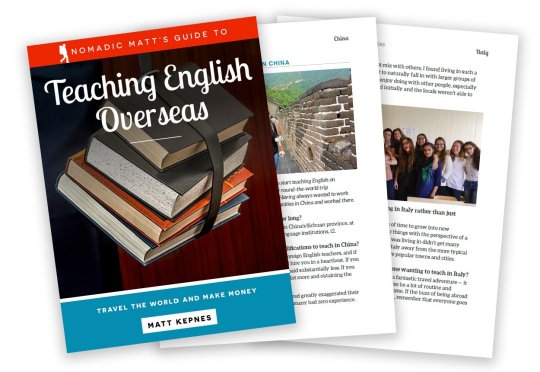
This digital guide will put you ahead of your competition, help you land a high-paying job with a reputable company, and give you first-hand knowledge from real teachers! Get started today with this downloadable PDF (for your computer, e-reader, or mobile device) with the book PLUS 12 interviews about life as a teacher, plus job advice from one of the industry’s top recruiters!
Book Your Trip to Spain: Logistical Tips and Tricks
Book Your Flight
Find a cheap flight by using Skyscanner or Momondo. They are my two favorite search engines, because they search websites and airlines around the globe so you always know no stone is being left unturned.
Book Your Accommodation
You can book your hostel with Hostelworld as they have the largest inventory. If you want to stay somewher eother than a hotel, use Booking.com, as they consistently return the cheapest rates for guesthouses and cheap hotels. My favorite hostels in Spain are:
Sungate One (Madrid) – Super clean, in a great location, and very social. They organize pub crawls, communal meals, and walking tours too!
Kabul (Barcelona) – This is the best party hostel in the city. It’s fun, social, and really easy to have fun and meet people.
La Banda (Seville) – Another fun and social hostel. They have an on-site bar and host huge communal dinners too. It’s lively and agreat place to meet people and party.
Don’t Forget Travel Insurance
Travel insurance will protect you against illness, injury, theft, and cancellations. It’s comprehensive protection in case anything goes wrong. I never go on a trip without it, as I’ve had to use it many times in the past. I’ve been using World Nomads for ten years. My favorite companies that offer the best service and value are:
World Nomads (for everyone below 70)
Insure My Trip (for those over 70)
Looking for the best companies to save money with?
Check out my resource page for the best companies to use when you travel! I list all the ones I use to save money when I travel — and I think they will help you too!
Looking for more information on visiting Spain?
Check out my in-depth destination guide to SPain with more tips on what to see and do, costs, ways to save, and much, much more!
The post How to Find a Job Teaching in Spain appeared first on Nomadic Matt's Travel Site.
from Nomadic Matt's Travel Site https://ift.tt/2SRWvyu
via IFTTT
0 notes
Photo
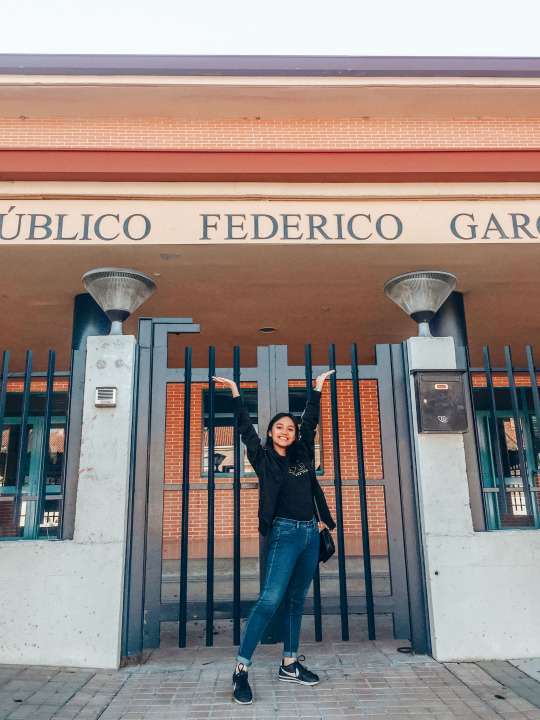


TEACHING EXPERIENCE: Handling 2º Primaria students
Assigned grades & subjects?
For the school year 2019 - 2020, I am currently assigned to 2º Primaria. There are four different classes and all of them has about 25 students in class. I assist in teaching Social Science, Natural Science and Language. I do this on Mondays to Thursdays, from 9 to 2 in the afternoon.
This would be my first time Handling little kids.
My prior experience with teaching or mentoring include serving the student body who were the same age as me as a head of an organization in the university and working alongside school administration. I originally requested to have high school during the applications because I wasn’t too fond of kids.
But the kids at my school do pull a heartstring. They’re some seven or eight years olds just so full of life, love and laughter. They inspire me to be a better teacher everyday and challenge me to transform them into their best selves.
My teaching philosophies?
It’s good to keep in mind that at twenty, I’ve just moved out of university and plunged myself right into the work force. Which means I only have just enough experiences (and no, they’re not teaching experiences) to tell you about what I believe in. Case in point, joining the Auxiliar de Conversación program is just as much as to learn from my students and them from me because you learning is a never ending process and experience is the best teacher.
“The teacher has become the master of his former master.”
I also believe that teaching is more than a profession, it is a lifestyle, a devotion you have to keep doing until something blooms out of it. Until your students are better than you’ve ever been.
Personal teaching goals and learning objectives for students?
1. To help improve my students linguistic abilities that they may one day be able to use it for something important, for an emergency or maybe even for the most mundane things
2. To introduce and champion the Filipino culture to Spain, one of its major colonizers in history; to be seen as equals and be treated with respect and appreciation
3. To work in an environment that will help me grow and to meet new people who will show me new perspectives in life
“History has its eyes on you.” from Hamilton: The American Musical is a quote I live by. It’s a reminder that nothing here is promised and what we will be remembered for is up to us.
0 notes
Text
Como se diz CONSEGUIR em inglês?

IMAGEM: ufabizphoto/Depositphotos | EDIÇÃO: Proddigital Idiomas
Salve galera! Tomara que vocês estejam prontos para estudar hoje! Por quê? Porque neste artigo eu vou ensinar como falar o verbo Conseguir em inglês, o verbo que eu acho o mais difícil a traduzir. É um verbo polêmico mesmo! Quando eu comecei a aprender o português, eu tive muito dificuldade com este verbo. Pessoas falaram bastante este verbo e, em vários contextos. Na época, alguém me falou que a tradução deste verbo é o verbo To Get em inglês. Isso acabou me enganando muito! A tradução deste verbo não é To Get e, neste artigo, vou tentar explicar o porquê disso.
Primeiramente, temos que pensar um pouco neste verbo em português e o significado. O verbo conseguir em inglês é um pouco como o verbo fazer ou o verbo inglês To Do. Estes verbos não possuem definições ou ações fixas em si. A ação do verbo depende totalmente do contexto e do objeto da frase. No caso de conseguir, o objeto da frase é frequentemente um verbo no infinitivo.
Como Aprender Inglês com Filmes e Séries? — E-BOOK GRATUITO
Em inglês, o verbo To Do é um verbo auxiliar (aprender mais sobre DO/DOES), que ajuda a criar perguntas e, como verbo principal da frase, pega sempre a definição com o objeto e contexto. Não podemos somente falar I Docomo frase (sem o objeto), não faz sentido nenhum. Igual falar eu consigo, ambas as frases exigirão uma resposta da pessoa escutando: “WHAT do you do?” ou “Você consegue O QUE?“.
Tudo isso para explicar que, como o verbo conseguir pode significar ações diferentes, tem várias formas de traduzir e não podemos usar somente o verbo To Get, que é frequentemente dado como tradução.
Não se preocupe! Vamos ver os jeitos mais fáceis e mais comuns de traduzir conseguir em inglês com mais explicações, exemplos e áudios. Pronto? Here we go!
Veja também:
Como se diz APROVEITAR em inglês?
Como se diz FICAR em inglês?
Como se diz DEMORAR em inglês?
Can — Conseguir
O verbo Can é um verbo auxiliar em inglês especial e irregular. É o único verbo que não tem a preposição to no infinitivo. Na verdade, não tem uma forma infinitiva certa. Este verbo é também excepcional por conta das conjugações limitadas, tem apenas o presente e o passado simples (can, could), não existe uma forma no futuro ou present perfect.
A tradução literária é o verbo português poder. Can é um verbo que é sempre seguido por um outro verbo quando não for uma pergunta ou resposta a uma pergunta. Veja bem:
I can’t wake up early in the morning, I’m always late. — ouvir áudio 🎧
Eu não consigo acordar cedo de manhã, estou sempre atrasado.
I tried to finish my work yesterday, but I couldn’t. — ouvir áudio 🎧
Eu tentei terminar meu trabalho ontem, mas eu não consegui.
I couldn’t download that film you recommended, the file was too heavy for my computer. — ouvir áudio 🎧
Eu não consegui baixar aquele filme que você indicou, o arquivo estava pesado demais para meu computador.
*A contração de could not é couldn’t e é bastante importante treinar. Aqui, o objeto é o verbo terminar, mas não precisamos repetir de novo.
My sister can always leave work early on Fridays, her boss is really great! — ouvir áudio 🎧
Minha irmã sempre consegue sair do trabalho cedo nas sextas-feiras, o chefe dela é realmente ótimo!
Revisando estes exemplos, o verbo poder poderia facilmente substituir o verbo conseguir, estamos falando de “ser capaz de” de que ambos verbos se tratam. Mais uma observação importante: não usamos a forma do infinitivo do verbo com a preposição to quando o verbo segue can, não podemos usar a preposição to na sequência de um verbo auxiliar.
To Be Able (To Do) — Conseguir
To Be Able (To Do) é uma forma de falar que é um sinônimo do verbo Can, mas com mais conjugações possíveis (usando o verbo To Do aqui como exemplo de qualquer verbo). Como Can tem somente Could como outra conjugação, To Be Able (To Do) segue a conjugação do verbo To Be em todas suas formas. Usamos muito mais esta forma para falar na forma negativa, no futuro e o present perfect. Exemplos vão ajudar bastante a entender o uso de verbo para expressar conseguir em inglês, inclusive os mesmos exemplos de cima trocando para este verbo.
Exemplos de cima trocando o verbo:
I tried to finish my work yesterday but I wasn’t able to. *
I wasn’t able to download that film you recommended, the file was too heavy for my computer. *
*Lembrando que a conjugação do passado simples do verbo To Be com o sujeito I é WAS. A contração de was not é wasn’t.
Novos exemplos:
I won’t be able to take a vacation this year, I can’t afford it. * — ouvir áudio 🎧
Eu não vou conseguir tirar férias este ano, eu não tenho dinheiro suficiente.
*O verbo To Afford é um verbo chave em inglês que se traduz como pagar, mas significa uma falta de dinheiro. A frase aqui é com conjugação do futuro é não podemos usar o verbo can que não tem uma conjugação igual.
Will you be able to come to my birthday party this weekend? — ouvir áudio 🎧
Vai conseguir vir para meu aniversário este final de semana?
I haven’t been able to eat meat since I watched a documentary about the beef industry. * — ouvir áudio 🎧
Eu não consigo comer carne desde que eu assisti a um documentário sobre a indústria de carne bovina.
*A palavra beef em inglês se trata de carne bovina. A palavra meat se trata da carne de qualquer animal inclusive porco e frango. A palavra since (desde) exige o uso do present perfect porque estamos falando de um período de tempo no passado até agora (o presente em inglês é usado somente para fatos e ações rotineiras).
Usamos muito pouco esta forma no presente simples. Neste contexto, usaremos muito mais o verbo can. Exemplos:
I‘m not able to understand my teacher because her accent is too strong.
O exemplo de cima está gramaticalmente correto, mas falaremos o seguinte:
I can’t understand my teacher because her accent is too strong. — ouvir áudio 🎧
Eu não consigo entender meu professor porque seu sotaque é puxado demais.
Outro exemplo:
I am able to go to the gym more often now because I stopped working in the evening.
I can go to the gym more often now because I stopped working in the evening. — ouvir áudio 🎧
Eu posso ir para a academia com mais frequência agora porque eu parei de trabalhar a noite.
To Manage (To Do) — Conseguir
Podemos considerar esta forma como um sinônimo à forma de falar To Be Able (To Do), mas este verbo tem mais uma definição que sugere um esforço versus a capacidade de fazer algo. Estamos mais falando de um resultado de esforço ou um impedimento ao resultado desejado que uma falta de capacidade. Este verbo frequentemente segue uma frase com uma explicação da tentativa, tarefa ou trabalho feito. Vamos ver abaixo como usar esse verbo para expressar conseguirem inglês:
I tried calling my bank all morning but didn’t manage to speak to anybody. — ouvir áudio 🎧
Eu tentei ligar para o meu banco a manhã toda, mas não consegui falar com ninguém.
I finally managed to buy a new cell phone for the price I wanted. — ouvir áudio 🎧
Eu finalmente consegui comprar um celular novo pelo preço eu queria.
Did you manage to book your flight to New York using air miles or did you have to pay full price? * — ouvir áudio 🎧
Você conseguiu reservar seu voo para Nova York usando milhas aéreas ou teve que pagar o preço integral?
*Full Price é um termo em inglês que significa o valor sem desconto de qualquer produto.
Nos exemplos acima, mesmo que o verbo To Manage dá uma ideia melhor do acontecimento, podemos substituir com To Be Able (To Do) sem problema.
O verbo To Manage é também a tradução dos verbos gestionar, gerenciar ou gerir, mas infelizmente não vamos cobrir isso neste artigo. É útil pensar que no contexto de gestionar, normalmente o objeto do verbo é substantivo em vez de um verbo, mas nem sempre!
Reparou que as formas acima são uma tradução do verbo conseguir em inglês quando o verbo está seguido por um outro verbo (objeto)? Isso é comum, mas usamos também o verbo conseguir com objetos que não são verbos, ou seja, são substantivos. Nestes contextos, usamos outras formas em inglês. Vamos lá!
To Get — Conseguir
Finalmente chegamos à tradução mais conhecida de conseguir em inglês, o verbo To Get. O verbo To Get é um verbo que tem várias traduções e, é provavelmente o verbo inglês que deixa os estudantes com mais dúvidas. Como este verbo tem vários significados, faz sentido que este verbo diverso possa ser usado para traduzir o verbo conseguir em inglês, também um verbo muito diverso.
Did you get tickets for the show tonight? — ouvir áudio 🎧
Conseguiu ingressos para o show esta noite?
I love the bike sharing scheme in Rio but, it’s really hard to get one at peak times. — ouvir áudio 🎧
Eu amo o esquema de bicicletas compartilhadas no Rio mas, é muito difícil conseguir uma nos horários de pico.
I got a raise, I’m so happy! * — ouvir áudio 🎧
Eu consegui um aumento de salário, estou muito feliz!
*Em inglês, o substantivo a raise significa um aumento de salário. Mais palavras não são necessárias.
I applied for a job at my favourite store and just found out that I got it!
Eu me candidatei para um emprego na minha loja preferida e acabei de descobrir que eu consegui!
O verbo To Get é transitivo, ele precisa de um objeto. Não pode falar somente I got, sem um objeto ou pronome. Usamos frequentemente o pronome It quando o objeto é definido na mesma frase (no caso do exemplo acima).
Frequentemente, o sentido nestes casos é obter algo. To Obtain é um verbo muito formal e pouco usado em inglês mas, isso ajuda a entender o sentido deste contexto.
Make It também significa conseguir, mas tem um sentido diferente ao que aprendemos acima.Acesse aqui e aprenda sobre Make It.
Então gente, finalmente terminamos! Espera que não tenha sido difícil demais! Acabamos de ver quatro formas diferentes de falar o verbo conseguir em inglês: Can, To Be Able (To Do), To Manage (To Do) e o famoso To Get. Gostou? Ainda na dúvida? Quer mais exemplos ou ajuda? Pode falar comigo! Deixe suas dúvidas ou comentários abaixo e responderei já já! Thanks so much!
Wait a second! Quero lembrá-los que recomendamos o uso da ferramenta Ankinos seus estudos do inglês. Esta ferramenta é usada no seu computador ou celular e, trabalha com o sistema de repetição espaçada. Achamos muito efetiva! Coloque lá todas as opções que se falar o verbo Conseguir em inglês para que você possa estar sempre revisando e não esquecer mais. Basta clicar aqui para descobrir mais sobre essa ferramenta, pois criamos um artigo completo sobre o que é o Anki e como baixá-lo no seu computador ou celular.
Como Aprender Inglês com Filmes e Séries? — E-BOOK GRATUITO
#aprender ingles#aulas de inglês#aula de inglês#aulas de inglês grátis#aulas de inglês online#curso de inglês#cursos de inglês#cursodeingles
0 notes
Text
Highlights of my experience (so far...)
Though the year is still not over, I’ve already had some very memorable days.
For the two days that came before the long Halloween weekend, the other auxiliars of my school, along with our coordinator, organized and implemented fun Halloween activities for nearly all students of ESO to participate in. Activities included bobbing for apples, musical chairs, mystery boxes, and lots of candy! My fellow coworkers and I dressed up in costumes and encouraged other students to as well!
I work with one teacher far more than others. Her name is Ana. She is young and one of the best teachers that I have ever worked with. She easily makes her classes fun, enjoyable, and stress-free for the students. She values students’ input and, at the end of each term, asks them for ways in which we could improve as teachers. She allows the students to express themselves creatively and lets them develop their own projects and ideas. It has definitely been a pleasure working with Ana this year.
Many of my Spanish coworkers have taught me a lot of Spanish history, such as the movida madrileña and what it was like before the change to democracy. This has really enriched my experience in Spain.
I have definitely developed friendships with some of my coworkers and the other Americans that work with me. Their friendship means a lot to me and has made this year a great one!
The students that attend my school are very special. For the most part, we all have great relationships. I love learning more about them and getting to know them on a deeper level. I will always carry these memories even after I leave the auxiliar program.
I had never taught classes other than English before this year. Teaching history, geography, and physical education has been a blast and has also taught me a lot more about being a successful educator.
We are currently learning how to dance in my physical education classes. I can barely walk so this has been very difficult for me. However, it’s a fun way to get to know the students and to have a good laugh with them. Iván and Ángel, the professors of PE, are some of my favorite coworkers.
Isabel, my bilingual coordinator, has also been a delight. She has been extremely helpful throughout the school year. She has made us feel right at home at our school and sees our participation in the program as an important part of the English department at school. She has made this year very special and exciting.
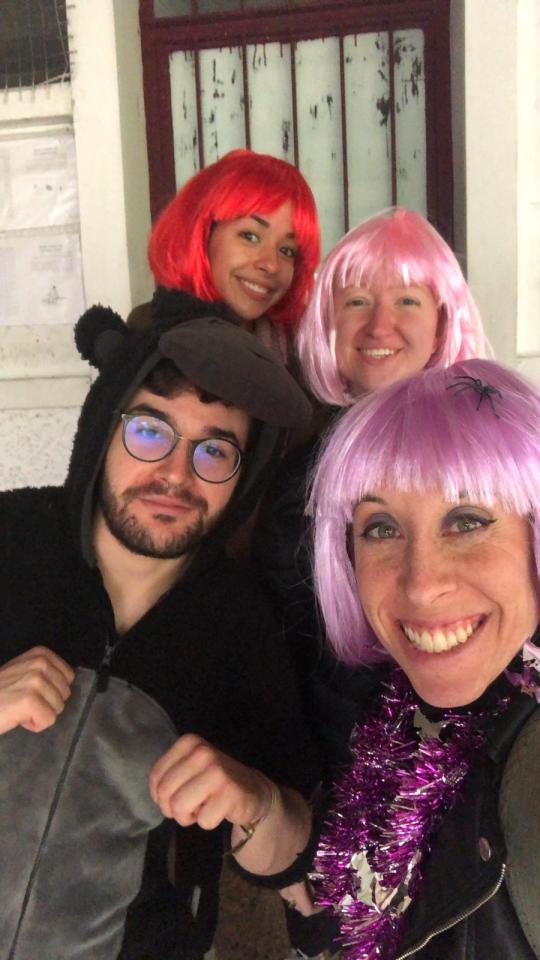
Me and my fellow auxiliars dressed up for our Halloween activities!

Onesies were in that season.

More of the English faculty enjoying the festivities.
0 notes
Text
I’m backkkkkk!
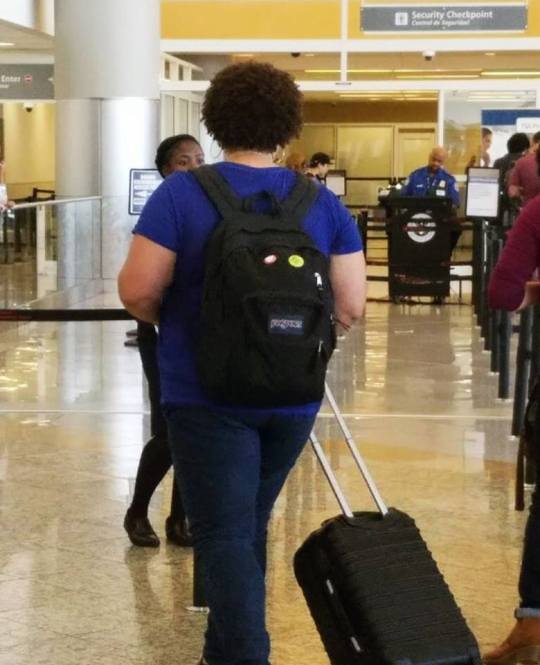
*record scratch*
*freeze frame*
Yup, that’s me…you’re probably wondering how I ended up in this situation…I mean, didn’t I literally just leave Spain and return to the U.S. after 7 months abroad???
*rewind*
Well I returned to the U.S., finished my degree at the University of Georgia, all the while wondering, “What is my post grad life gonna look like?”
Well it took lots (& LOTS) of effort, but I am now 100% prepared for my return to the country so dear to my heart, Spain! It has been a long, difficult year arranging this return, and, yes, it has been (more or less) in the works since the moment the wheels of my airplane hit the landing strip at Hartsfield-Jackson airport back in July of last year.
In an effort to revive this blog for my return, in this post, I will give a brief overview of what’s happened throughout my last year back home. Plus a timeline of sorts, detailing the things I’ve had to go through to get back to Spain.
August-November 2016: Return to school; senior year = YAY! but also mixed with horrible reverse culture shock and post-study/live abroad depression = BOO. Yearning to go back to Spain is on the rise.

December 2016: A thought pops into my head, courtesy of my study abroad group message, which was still going strong at the time. Someone asks if anyone is thinking about returning to Spain after the school year ends to teach English for the year, and I think, “Um…YES!”
January 2017: (1) Applications open for Auxiliares in Spain (a Spanish government-run program that doesn’t pay much, but it’s cheap to live in Spain, so it’ll be plenty). (2) Student teaching and EdTPA begin, severely limiting the time I can dedicate to preparing for Spain, but *~*priorities*~* (3) Convince one of my best friends, Justin (https://beyondbordersaaa.tumblr.com/) to come join me in Spain!
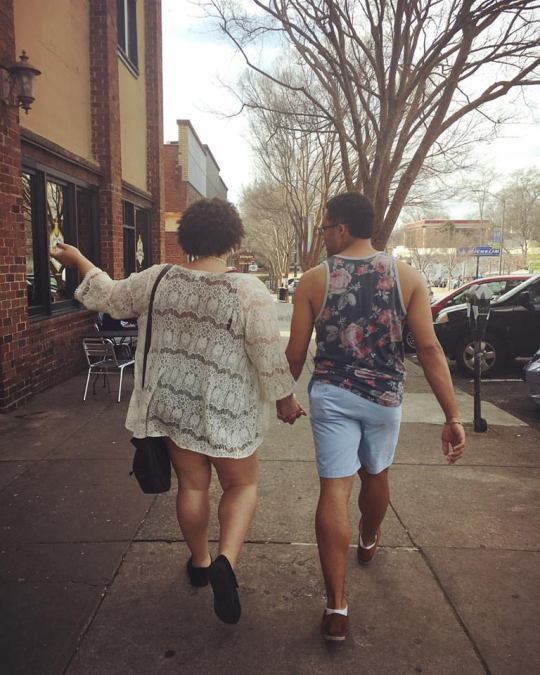
February 2017: Successfully finish the application process, which requires little more than filling out some paperwork, obtaining a letter of recommendation, and writing up why I’d like to do the program (easy enough).
March-April 2017: Wait to hear back from the program and focus on finishing EdTPA for school.
May 2017, a BIG month: (1) Mildly freak out as I finish up student teaching/EdTPA and have nothing to occupy my mind, as I anxiously await my regional placement; even consider switching to CIEE / any other teaching abroad program (even a teaching position in Thailand). (2) Find out I’m placed in Andalucía, and scream of joy!! I got my top choice!!! (3) Return to work after student teaching to start saving for Spain. (4) Schedule my visa appointment at the Spanish Consulate in Miami, the closest one to me and already booked for months. (5) GRADUATE SUMMA CUM LAUDE FROM THE UNIVERSITY OF GEORGIA <3

June-July 2017: (1) Find out my city/school placement when I receive my carta one night at 4 in the morning; subsequently spend the rest of the night looking up everything there is to know about my small, seaside city, Motril in the province of Granada! (2) Have several mental breakdowns as I gather everything I need for my visa appointment. (Seriously, it’s insane how difficult and expensive this process is, but once you’re done, there’s an immense feeling of accomplishment! Although I could do without the whole spend-hundreds-and-hundreds-of-dollars part. For a list of everything required by my consulate at least, go to http://www.exteriores.gob.es/Consulados/MIAMI/en/InformacionParaExtranjeros/Pages/Visa%20Requirements/Student-Visa.aspx) (3) Check the visa website every ~0.00002 seconds for new appointment openings (since it was initially completely booked until September) until I finally settle for one in early August. (4) Move out of my apartment and onto my best friend Caroline’s couch fo’ freeeeee. (5) Continue working, as well as enjoying my last summer in Athens with all my friends!
August: (1) Turn my required visa trip down to Miami into a fun mini-vacation/road trip with Caroline and Justin; also take this opportunity to begin my travel vlog (https://youtu.be/B_ftY4178zA). (2) Take a few unexpected trips up to Boston, as my sweet abuela passes away </3. (3) Receive my visa through the mail two weeks later after a horrific scare that it had gotten lost in the mail. (4) Continue living on Caroline’s couch for the month, working, and living it up in Athens.

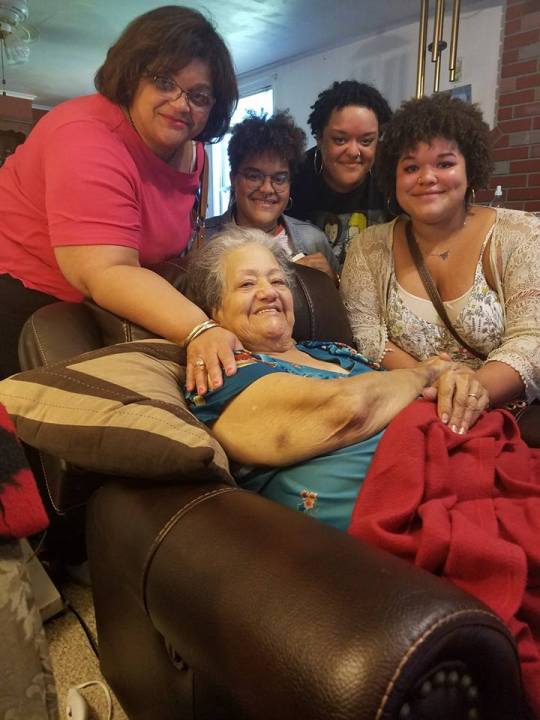
September, another HUGE month: (1) Quit my job of over 4 years (with several months’ notice of course) after saving a good bit of money. (2) Say goodbye to Athens and so many of my good friends. (3) Return to my mom’s apartment to spend my last week at home in the company of my family <3. (4) Unpack, pack, repeat. Seriously, I tried so hard to get my checked bag under the 50 lb limit, but packing for 8 months / 4 seasons made this impossible, and I ended up having to pay the $100 fee. (5) FLY TO SPAIN. This was a horrible, what was supposed to be 12-hour trip turned into 40 full hours of tears, sweat, and broken sleep. To be more specific: my first flight being delayed caused me to miss my connecting flight, have to sleep on the cold airport floor in a crowd of people in similar situations, add a connection in Madrid, and finally arrive in Motril after 4 airports, 3 flights, 2 train rides, and 1 bus ride. (6) Move into my apartment immediately upon arrival to my city and finally meet my roommate, Tori, in person after having met on the program’s Facebook group and only skyping once.


Present time (still September, but I figured I’d break it up anyway): It’s now September 25. I’ve been in Spain for several days now and have exactly one week before I begin teaching. I’ve completely unpacked, taken a couple relaxing trips to the beach, spent several hours out and about and exploring my new home-away-from-home, met some Spanish friends, bonded with my roommate, and even had a night out on the town! This city is small enough that everything is basically within walking distance, even the beach! Also, I’ve only once before been to a part of Spain where they still do the whole “order a drink and get a free tapa with it” thing, so that’s been really cool! I’ve also been able to go food shopping twice now, and it’s blown my mind both times how inexpensive it is to live here! My roommate also helped me open a bank account here, which was a BIG stress-reliever. The people here seem so nice, even though they still stare, but I knew that was going to be a thing coming in, being a foreigner in a small city. And the Spanish have NO shame whatsoever about staring, which is something I learned last year in Sant Cugat hahahaha. Anyways, a few other things I have on my plate for the next few weeks are obtain my TIE (basically the ID card I have to get that says I can legally live here), apply for income-based loans (definitely cannot swing $200/month in payments with the amount I’ll be getting paid through this program), meet the teachers at my school (which I’ll be doing this Thursday), plan my birthday trip to San Sebastian with Justin and my other friend here, Martha (I have lots of friends that decided to come back to Spain/Europe to teach English/study), and continuing exploring my new city. Welcome back to Spain @me! <333
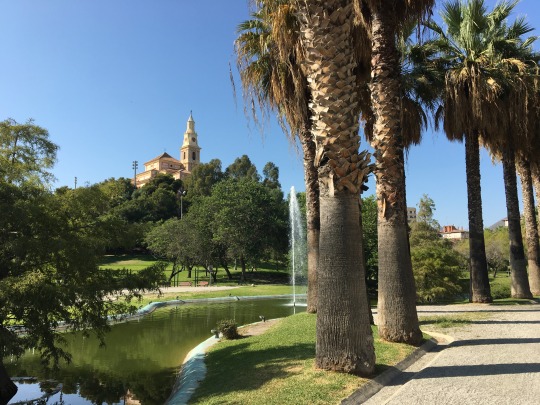

P.S. I’m planning my next blog to take a deeper look into my city and apartment. I’m gonna try to keep up with this blog at least once or twice a week with updates on what I’m doing, as well as links to any travel vlogs I make! However, I have no idea what my workload will be / how many private classes I will take on to earn a lil’ extra money on the side, so let’s see how this goes!
#teachabroad#spain#motril#studyabroad#visa#universityofgeorgia#uga#moveabroad#granada#andalucia#delta#travel#travelabroad#graduation#travelblog#travelvlog#miami#teachenglish#teacher#teachenglishabroad#flightdelay
0 notes
Text
Oops.
Hey there tumblr! (aka Mom) Sorry it has been almost a year... it’s true what they say, time flies when you’re having fun! I’m terribly sorry that I stopped keeping you all updated on my travels, but things got crazy busy! Plus for me this has always been a travel blog, not a “me living my life” blog, but now it turns out they are one in the same! I could type for days and days about all the trips I took over 2018, but here’s a brief overview:
After spending New Years in London with Hanna, Carmi and I went to Valencia to try some real paella. We hit the beach, rented bikes and visited their science museums and aquarium when it rained. A few weeks later I was off to Morocco with my coworkers. I almost bailed on the trip because I was afraid of spending so much time with people that I only kind of liked, but it ended up being SO MUCH FUN. We visited my friend Sahar in Tangier for a day, then hit the “blue city” of Chefchaouen before driving a full day to Marrekech. Renting a car has become my new favorite way to travel, because even though it was a bit nerve wracking at first, it allowed us to see so much! In Marrekech we stayed in the most beautiful hostel of my entire life and I ate so so so much couscous. We wandered around the Medina, went to the botanical gardens and went into about a thousand different markets. The following weekend, Carmi and I decided to celebrate our birthdays by taking a girls trip to Paris. It was freezing but we treated ourselves to the fanciest macaroons and rooftop champagne. We saw the Eiffel tower every single day, sat in the gardens outside the Louvre and went shopping in the Galleries.
The traveling continued into March, when I went to Stockholm to visit Hanna and her sister for a weekend and saw Harry Styles in concert. It was also freezing in Stockholm, but SO PRETTY. It was a super quick trip, but l loved getting to see Hanna in her element, and getting to play in the snow! The weekend after, things just kept going. I got super lucky that Lizzie’s spring break fell during the same week, so she came out to visit for 10 days, and we explored Madrid, Toledo, and Lisbon! I LOVED Lisbon and tried surfing for the first time! My instructor was super hot though and I couldn’t focus on surfing long enough to stand up. I’ll definitely have to try again! Lizzie and I spent the rest of our days eating “Pastel de Nata” and walking up and down the huge hills, admiring all the gorgeous tiling. They say that Lisbon is like the San Fransisco of Europe, and it’s true! They even have the Golden Gate Bridge.Naturally things slowed down after spring break, as I had run out of energy and money! But for our last school break Carmi and I went to Mallorca and I tried cliff diving for the first time, and took a much needed spa day. It was a little bit chilly and we didn’t get to enjoy the beach as we would have liked to, but we rented a car and got to see some really amazing little spots on the island.
Amidst so much traveling, I also tried to appreciate all that Madrid has to offer, and enjoyed many “menus del dia” with my coworkers ($10 meals that include two dishes, a dessert and a drink, I’m obsessed) and for San Isisdro, Madrid’s patron saint holiday, and I enjoyed dressing up with my coworkers in the traditional dress. Before I knew it, the year was coming to a close and I was packing up my room to go back home for the summer. It was sad to say goodbye to the city, but so so wonderful to see all of my family and friends. I had the warmest welcome at the airport and things didn’t really slow down from there. I stayed with Melanie, Anthony, and their new cat Humphrey. I spent my days sleeping in, working for my mom, and trying to spend as much quality time as possible with everyone, while keeping in touch with my people back in Spain and Europe. Being home for 2.5 months was a long time, and by the time mid-September rolled around, I was ready to head back. With all my stuff at Carmi’s house and no place set up to live, I was super nervous, but ended up finding an AMAZING apartment that I absolutely love. I’m a 10 minute walk away from the park and my gym and a 20 minute (although I love to cut it close and make it 15 minute) walk from work. I live with two Spanish boys who are super nice and speak English really well when I’m too tired to think. I spent my last two weeks before work getting settled back into the city, and officially declaring my relationship with my boyfriend Mario. I had met him right before leaving to go home for the summer but we continued to talk every single day, and needless to say I was pretty glad to see him when I got back.
Spending three months without officially working was pretty tough, so I was very excited to go back to work in October. I’m the only auxiliar that returned from the group last year, and the first day back was amazing. I don’t think I’ve ever had so many hugs and kisses in one day. I don’t know who was more excited, the kids, the teachers, or me! Barely two weeks into being back at work, we had a long weekend, so Carmi and I took advantage and decided to go to the beach! We stayed in an AMAZING AirBnB literally right on the beach in Nerja (outside of Malaga) and spent two days swimming and snorkeling in the crystal clear water. The next weekend, I was back at it and jetted up to Gothenburg to see Hanna! We had a blast (as per usual) and spent our time getting caught up and then went to the amusement park! As always, time went way too quickly and I was heading back to Madrid. I’m so glad I went when I did, she’s accepted an internship in Uganda for three months!
Now having been back for about a month, some of the charm is definitely wearing off and I am getting settled back into my rhythm. I like my new coworkers, but it has been adjustment from the diverse group last year to being with four other girls who are very similar to me this year. Being in a relationship is also helping me explore new parts of Madrid, but leaves me with even less time to keep you all updated. I promise that I will try to be better this year. I think Carmi and I are going to try to plan a quick weekend trip to Galicia next week, so I’ll let you all know how it goes. For now, here’s some representative pictures from the course of the year!
0 notes
Text
Hello!
I am Tanya, and I come from the Philippines. Some people both in the school where I work as an auxiliar de conversación and even some Spanish people in general are surprised when they hear this. Yes, Filipinos speak Filipino AND English - we use both languages as media of instruction from preschool onwards.
I studied Spanish as my major discipline and English Studies as my minor discipline, and came to be an auxiliar de conversación immediately after graduating from university. While in university I was a member of a Spanish language organization, and it was with tutorials there where I had my first experience with teaching children.
This is my second year as an auxiliar in the Colegio Público Bilingüe Ciudad de Columbia, and so far I've worked with third, fourth, and sixth graders. I believe that I am getting along well with the teachers at school too, and for me the school fosters a wonderful working and language learning environment for both teachers and students.
It is fun to be able to share both aspects of my culture and also help teach the English language to children - while sometimes it's not easy for them to understand, there is a certain feeling of fulfillment when they finally show that they're making progress with learning things.
0 notes
Photo

Finalmente tuve el honor de conocer en persona al gran maestro Jeff Dantas. Soy su seguidor desde hace años, amo su trabajo y sus excelentes auxiliares de entrenamiento. Como bonus de oro recibi una lección de "Position Stick" de la mano del propio Señor Dantas ! En mi perfil les dejo el link del video: ---------------------------------------- Finally I had the honor of meeting in person the great teacher Jeff Dantas. I been his follower for years and I love his work and his excellent training aids. As a gold bonus I received a "Position Stick" Lesson from the hand of Mr Dantas ! At my profile I leave the video link to you: @PositionSticks (en Orange County Convention Center)
0 notes